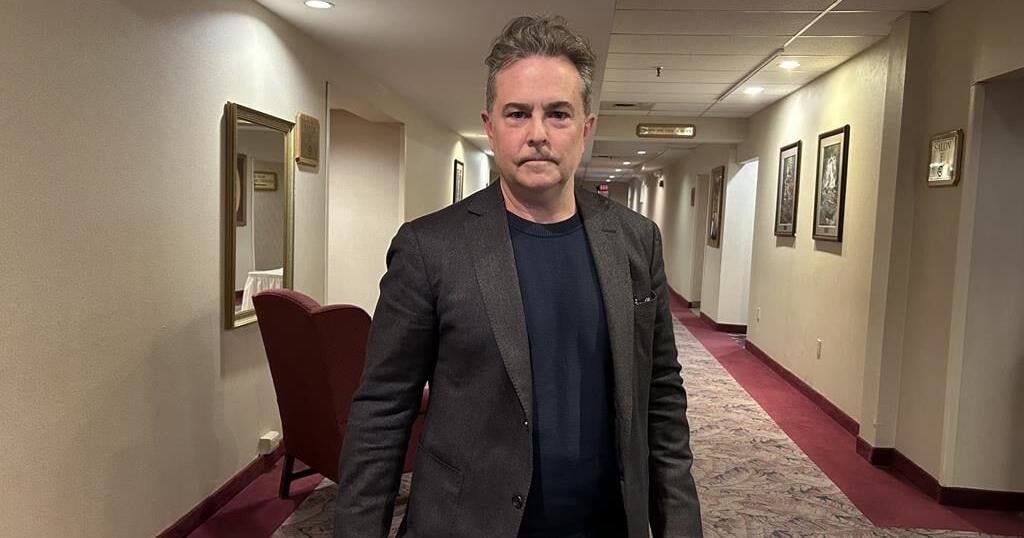FREDERICTON – The son of a 78-year-old man who died in a Fredericton emergency department after waiting to be seen for nearly seven hours says New Brunswick’s premier is using his father’s death to score political goals ahead of an election.
Ryan Mesheau said he was taken aback by Premier Blaine Higgs’s recent vow to shield health-care workers from legal action in response to a lawsuit filed by the Mesheau family alleging their father died because he received inadequate care.
“I became quickly appalled because of the misinformation that Premier Higgs chose to spread in his statements, seeming to use the death of my father for what appeared to be a self-serving attempt to gain political points,”Mesheau said in anemailedstatement.
“Premier Higgs must understand that the best way to garner political gain from this situation is to earn it. And there is an opportunity now to do so.”
Darrell Mesheau arrived in an ambulance at the Dr. Everett Chalmers Regional Hospital on July 11, 2022. A nurse found him about seven hours later in the waiting room, unresponsive andslumped in his wheelchair. His death prompted widespread public outcry and increased scrutiny of the state of the province’s health system.
At the time, Higgs said Mesheau’s death was “simply unacceptable” and in response, he replaced his health minister and the head of Horizon Health Network, which oversees the province’s anglophone hospitals. A coroner’s inquest in April found that Mesheau died of heart failure.
His family filed a lawsuit in July, alleging Mesheau died because of “reckless and outrageous acts and omissions” made by Horizon Health and two nurses at the hospital, Danielle Othen and April Knowles. The lawsuit filed in New Brunswick’s Court of King’s Bench names the Horizon Health Network and the two nurses as defendants. Its claims have not been tested in court.
In an email, Kris McDavid, spokesman for Horizon, said the health authority “won’t be making anyone available for interviews,” when asked if the nurses named in the lawsuit wanted to comment.
In an emailed statement, Horizon president Margaret Melanson said the health authority is committed to improving the quality of service it offers to patients. “Horizon deeply values our nurses, physicians, and health-care professionals and their well-being is important to us,” she said.
The lawsuit alleges Mesheau was triaged at a level that required his vitals to be checked every 30 minutes, but it says they were only checked twice in the seven hours he was in the ER. It also claims Othen did not ask Mesheau about his medical history. Mesheau had a history of cardiac issues.
In a statement last week, Higgs said his “government strongly objects to the legal tactic of naming nurses personally” in the lawsuit. He also promised to introduce legislation to protect health-care professionals from being named in future lawsuits.
Nicole O’Byrne, associate professor at University of New Brunswick’s faculty of law, said such legislation would be an anomaly in Canada.
“I’m not aware of this happening in any other jurisdiction,” she said in an interview. “When you have alleged wrongdoing, you can bring a lawsuit against the people you think are responsible for the wrongdoing.”
O’Byrne said it is not unusual for nurses to be named in lawsuits about patient deaths. People are typically named because the complainant is trying to establish that a health authority can be held vicariously liable for their actions, she said.
“They’re going to name all parties that may have played a role, no matter how small,” O’Byrne said. “It’s easy to remove parties once the proceedings have started, but it’s very, very difficult to add parties once things have begun. You name everyone that you think may have played a role, and that’s how you start.”
But by putting out a statement, she said it could be argued that Higgs is potentially interfering in a matter that’s before the court.
Higgs also said the coroner’s inquest did not find any instances of negligence on the part of the nurses. However, Ryan Mesheau said the purpose of an inquest is not to assign blame, but to answer questions about what happened.
It is the purpose of the court to determine if someone was negligent, he said.
“Everyone in New Brunswick needs (Higgs) to turn his focus to the deep, real, and measurable positive actions that will improve New Brunswick’s health care system — those things that will truly benefit our front-line health-care professionals and our citizens,” Mesheau said.
He said his family has asked Higgs to apologize publicly for Darrell Mesheau’s death. The family, he said, did not receive a response to the request.
This report by The Canadian Press was first published Aug. 31, 2024.
